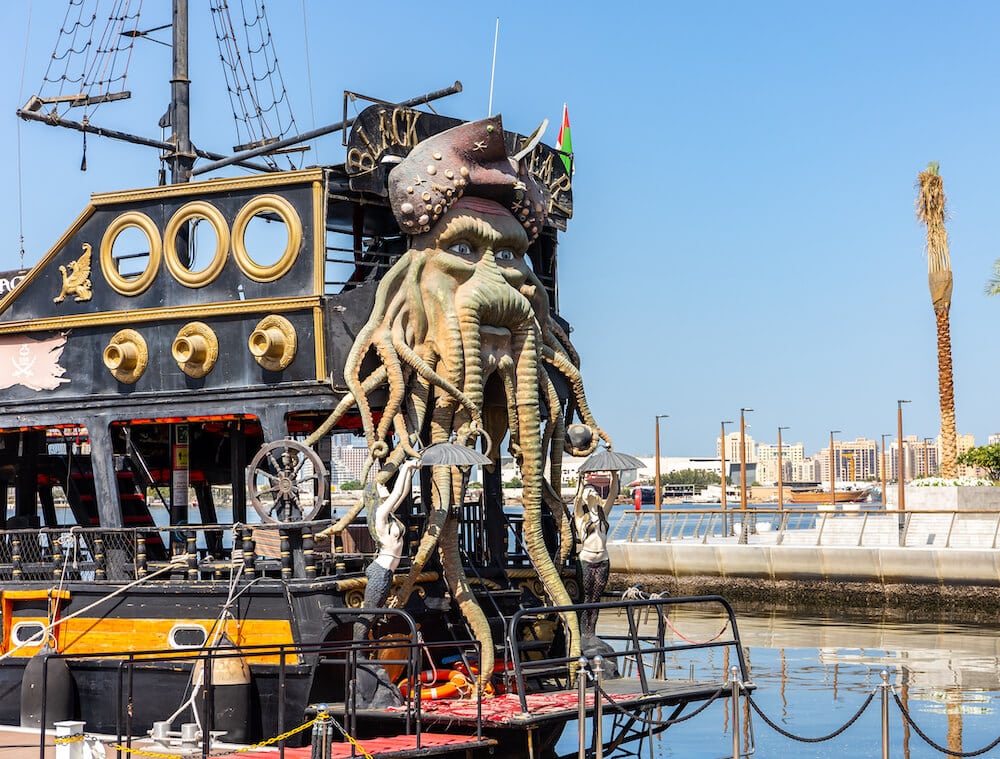The Real Story Behind The “Davy Jones’ Locker”

“Do you fear death?” often asked Davy Jones, the legendary captain of the ghost ship Flying Dutchman, in the movie Pirates of the Caribbean: At World’s End.
Davy Jones, the fictional character- an octopus-faced man with tentacles and saucer eyes with his heart kept in a chest as a forever memory of his love’s betrayal- is a cruel sailor with everlasting greed for violence.
For most of us, this octopus-faced Davy Jones comes to mind when somebody mentions ‘Davy Jones’ Locker.’
For the observant, of course, Davy Jones’ Locker is where Jones raises the Black Pearl after making a pact with Jack Sparrow in the movie. Not just this movie but many other movies, novels, and poems have told the story of Davy Jones Locker.
What is Davy Jones’ Locker?
Indeed, there’s always an element of truth in fiction, and the stories around Davy Jones’ Locker do a better job of presenting facts. However, the story behind the phrase differs from its fictionalized version; some legend details seem true.
According to the mythology of sailors, the phrase “Davy Jones’s Locker” is an idiom that refers to the seabed, the resting place of thousands of sailors who drowned at sea.
Sailors use the phrase to denote the afterlife of seafarers or even objects, including ships destined to rest at the ocean’s bottom.
Nevertheless, in its euphemistic sense, the phrase has been part of the English language for an extended period, and the word’s origin remains disputed.
Stories, Myths, and Legends About the Locker
The first reference to Davy Jones’s Locker dates back to the 18th century. It was popularised as a nautical superstition among sailors and pirates.
In earlier times, the name Davy Jones was referred to as the sailors’ devil and, sometimes, the evil god of the seas. However, historians have been unsuccessful in tracing the term’s origin, arguing that its root dates back centuries, and the stories were passed down through word of mouth.
Though the origin of the phrase remains unclear, there have been several attempts to explain the truth behind it in the past.
The prominent among these tales, those that appeared in movies and writings, is the story of Jones as the captain of the mysterious ghost ship ‘Flying Dutchman.” He was also responsible for ferrying the souls to the other world and could set foot on land after a decade and reunite with Calypso, the sea goddess. However, when he came back, she was not there.
The Flying Dutchman, a mainstay of maritime lore, is a legendary ghost ship doomed to sail the oceans forever since it can’t make port due to the rough waters.
In one of the other stories, Davy Jones refers to David Jones, a pirate captain who sailed across the Indian Ocean in the 1630s.
However, many historians reject this possibility, arguing that the person mentioned in this story was not popular enough to become a legend, as is Davy Jones.
Davy Jones, a publican who ran a British pub, tells another story. This avatar of Davy Jones used to make his customers drunk and imprison them in his ale locker, only to sell them off to passing ships as enslaved people.
The British pub owner later became a pirate after he went bankrupt. Stealing a ship, he went on to sail across the Atlantic Ocean and capture other ships and their crew abroad. While he decapitated most crew members, the remaining were locked before the vessel sank.
For some, Davy Jones represents an infamously myopic sailor named Duffer Jones, who often fell into the sea from his ship. Another interpretation points to the 19th-century dictionary that refers to the name as a “ghost of Jonah,” the biblical seaman whose name meant lousy luck to sailors.
According to the Bible, God punished Jonah for his disobedience, and he became the “devil of the seas,” after which the crew aboard his vessel killed him.
Another version of the Jonah story refers to the prophet who happened to spend a few days inside the whale and connects his days in the tract of a whale with the Davy Jones’ Locker.
Among the Welsh seafaring community, Davy Jones refers to their patron saint, Saint David, whom they believe saves them from the ocean’s harsh nature. According to this legend, St. David will only protect the good sailors, while the immoral seafarers will be sent to Davy Jones’ Locker.
Some theories also suggest that “Davy Jones” comes from the name of Duppy, the West Indian malevolent ghost. According to the lore that did rounds among the people in the islands, Duppy comes out at night to haunt people.
Nonetheless, these stories are not supported by any credible evidence. These remain just stories. Thus, for some sailors, Davy Jones is no one but another name for Satan.
References to Davy Jones’ Locker
It is said that many sailors when the lore of Davy Jones was very popular, refused to discuss the stories in great detail amongst themselves. But at the same time, the tradition of paying homage to Davy Jones was in practice, especially during the celebrations of the Equatorial line crossing.
Meanwhile, long before the movie Pirates of the Caribbean, the story of Davy Jones and his locker was told in several books, mainly works about pirates.
Daniel Defoe’s Four Years Voyages of Capt. George Roberts, published in 1726, is believed to be the first known work to mention Davy Jones in a negative sense.
Similarly, Tobias Smollett’s The Adventures of Peregrine Pickle, published in 1751, also mentions Davy Jones, an evil spirit that comes in various shapes on the eve of hurricanes, shipwrecks, and disasters. However, Davy Jones’ locker reference was first found in an 1803 Naval Chronicle.
During the 19th century, Davy Jones and his locker appeared in some naval and adventure fiction. Washington Irving’s Adventures of the Black Fisherman published in 1824, and Edgar Allan Poe’s 1835 novel King Pest are prominent examples of such works.
Other 19th-century works that mention Davy Jones include Herman Melville’s classic novel Moby-Dick, published in 1851, Charles Dickens’s Bleak House (1852-1853), and Robert Louis Stevenson’s Treasure Island, published in 1883.
Even in the following centuries, despite the fact that the truth behind Davy Jones and his locker was disputed, various literary works depicted similar characters and mentioned the legend several times.
Disclaimer: The views mentioned above are of the author only. Data and charts, if used in the article, have been sourced from available information and have not been authenticated by any statutory authority. The author and Marine Insight do not claim it to be accurate nor accept any responsibility for the same. The views constitute only the opinions and do not constitute any guidelines or recommendation on any course of action to be followed by the reader.
The article or images cannot be reproduced, copied, shared, or used in any form without the permission of the author and Marine Insight.
Do you have info to share with us ? Suggest a correction
Subscribe To Our Newsletters
By subscribing, you agree to our Privacy Policy and may receive occasional deal communications; you can unsubscribe anytime.
Web Stories










I’ve learn several excellent stuff here. Definitely price bookmarking for revisiting.
I surprise how so much effort you set to make this sort of excellent informative website.
Davy Jone’s locker was also referred to in the true account of Lieutenant James C. Whittaker’s book, “We Thought We Heard the Angels Sing.” This is an awesome and amazing true account of 8 men stranded on the Pacific Ocean for 17 days. So worth reading!!!!
Nope, when I heard Davy Jones, the SpongeBob version is what comes to my mind.
St David is the patron saint of Wales, mate. Not St Davis!! 🙂
This is “Davy Jones” here any and everything you’ve heard of my locker is false my mates made up the story due to my room being such a mess and disorganized you got lost can you find their way out and ended up dying in my room so when I would find their carcass in my room I put them in their own ship locker and the from out into the ocean Ha Hah Hah Hah Hah Hah Hah Hah Hah now mates if that’s not believable climb aboard my ship and you can “sea” for thy self
Ha… SpongeBob is what came to my mind also lol.. that silly sponge really has an impact on our culture in A major way.
Just for clarification, that stuff about God making Jonah the devil of the seas as punishment for disobedience isn’t the bible version. The prophet being stuck in the belly of a fish is the Bible version (sans the Davey Jones locker part).
Thanks for your inputs!
i was just curios
So are we 🙂